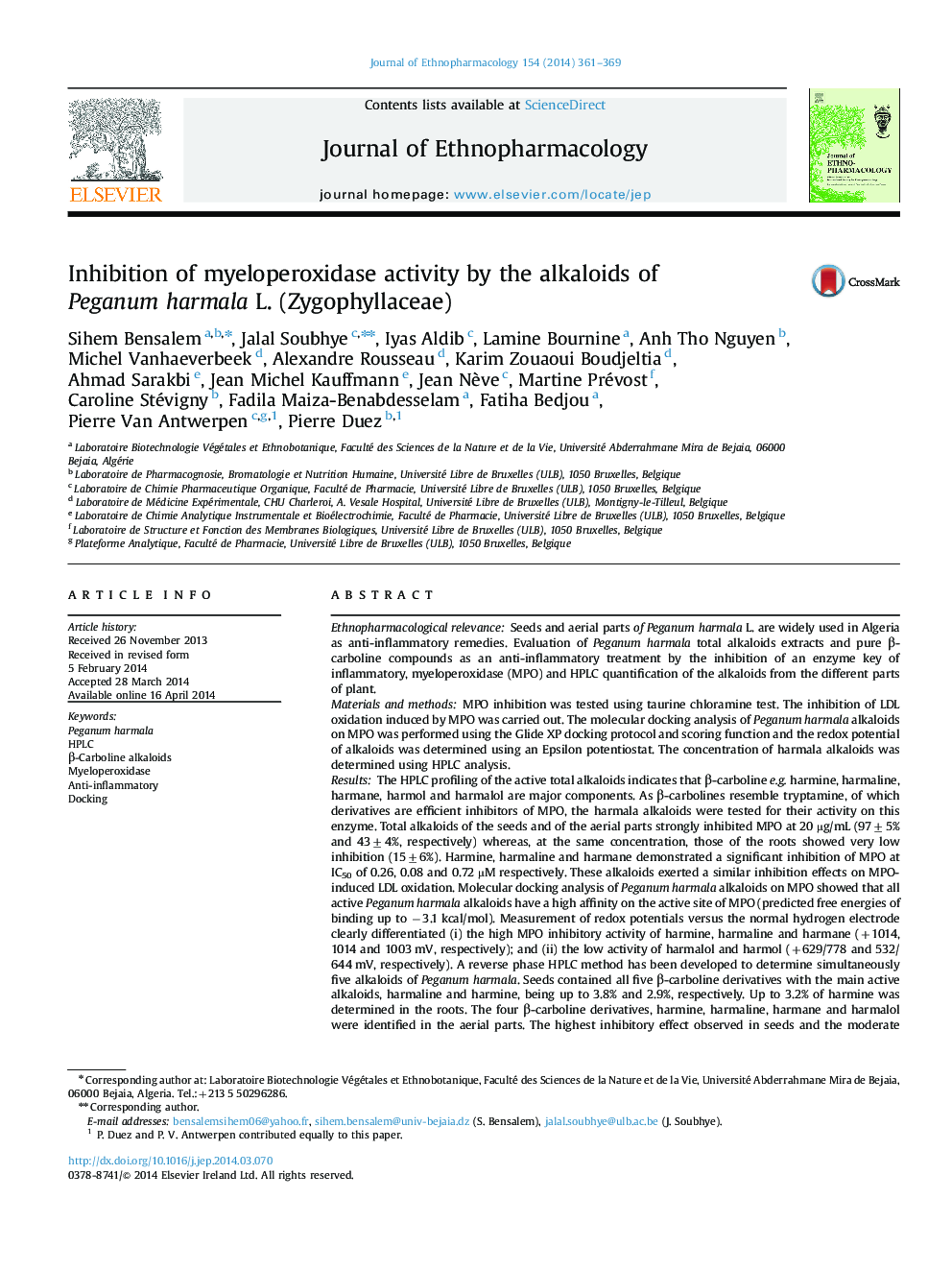| Article ID | Journal | Published Year | Pages | File Type |
|---|---|---|---|---|
| 2545139 | Journal of Ethnopharmacology | 2014 | 9 Pages |
Ethnopharmacological relevanceSeeds and aerial parts of Peganum harmala L. are widely used in Algeria as anti-inflammatory remedies. Evaluation of Peganum harmala total alkaloids extracts and pure β-carboline compounds as an anti-inflammatory treatment by the inhibition of an enzyme key of inflammatory, myeloperoxidase (MPO) and HPLC quantification of the alkaloids from the different parts of plant.Materials and methodsMPO inhibition was tested using taurine chloramine test. The inhibition of LDL oxidation induced by MPO was carried out. The molecular docking analysis of Peganum harmala alkaloids on MPO was performed using the Glide XP docking protocol and scoring function and the redox potential of alkaloids was determined using an Epsilon potentiostat. The concentration of harmala alkaloids was determined using HPLC analysis.ResultsThe HPLC profiling of the active total alkaloids indicates that β-carboline e.g. harmine, harmaline, harmane, harmol and harmalol are major components. As β-carbolines resemble tryptamine, of which derivatives are efficient inhibitors of MPO, the harmala alkaloids were tested for their activity on this enzyme. Total alkaloids of the seeds and of the aerial parts strongly inhibited MPO at 20 µg/mL (97±5% and 43±4%, respectively) whereas, at the same concentration, those of the roots showed very low inhibition (15±6%). Harmine, harmaline and harmane demonstrated a significant inhibition of MPO at IC50 of 0.26, 0.08 and 0.72 µM respectively. These alkaloids exerted a similar inhibition effects on MPO-induced LDL oxidation. Molecular docking analysis of Peganum harmala alkaloids on MPO showed that all active Peganum harmala alkaloids have a high affinity on the active site of MPO (predicted free energies of binding up to −3.1 kcal/mol). Measurement of redox potentials versus the normal hydrogen electrode clearly differentiated (i) the high MPO inhibitory activity of harmine, harmaline and harmane (+1014, 1014 and 1003 mV, respectively); and (ii) the low activity of harmalol and harmol (+629/778 and 532/644 mV, respectively). A reverse phase HPLC method has been developed to determine simultaneously five alkaloids of Peganum harmala. Seeds contained all five β-carboline derivatives with the main active alkaloids, harmaline and harmine, being up to 3.8% and 2.9%, respectively. Up to 3.2% of harmine was determined in the roots. The four β-carboline derivatives, harmine, harmaline, harmane and harmalol were identified in the aerial parts. The highest inhibitory effect observed in seeds and the moderate effect of aerial parts could be explained by their harmine and harmaline content. In contrast, the very weak inhibition of the root extract, despite the presence of harmine, may tentatively be explained by the high concentration of harmol which can reduce Compound II of MPO to the native form.ConclusionThe inhibition of MPO by Peganum harmala β-carboline alkaloids, herein reported for the first time, may explain the anti-inflammatory effect traditionally attributed to its herbal medicine.
Graphical abstractFigure optionsDownload full-size imageDownload high-quality image (240 K)Download as PowerPoint slide
